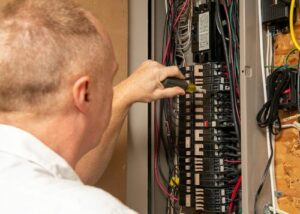Knowing how to reset a circuit breaker is an essential skill for any homeowner. At Boulden Brothers, we understand the importance of a well-functioning electrical system for your home’s safety and comfort. Circuit breakers protect your home from electrical issues like overloads, short circuits, and other faults. Understanding the process and safety precautions ensures you can handle minor electrical problems safely and efficiently.
Why Won’t the Circuit Breaker Stay On?
 When a circuit breaker won’t stay on, it indicates a persistent problem.
When a circuit breaker won’t stay on, it indicates a persistent problem.
Here are some common causes:
Overloaded Circuit
An overloaded circuit means too many devices are drawing power simultaneously. This is the most common reason for a breaker to trip. Reducing the load by unplugging some devices can often resolve this issue.
Short Circuit
A short circuit happens when a hot wire comes into contact with a neutral wire, causing a surge of electrical current. This is a serious issue that can lead to damage or fire. Signs of a short circuit include a burnt smell or visible charring around outlets and devices.
Ground Fault
A ground fault occurs when a hot wire touches the ground wire or a grounded part of the junction box. This can create an unintended path for electricity, resulting in the breaker tripping. GFCI breakers are specifically designed to detect and prevent ground faults.
Faulty Breaker
Sometimes the breaker itself may be faulty. If a breaker is old or has been reset numerous times, it might fail to stay on due to internal wear. Replacing the breaker might be necessary in such cases.
Environmental Factors
Moisture, dust, and pests can affect the breaker and cause it to trip. Moisture in particular can create conductive paths that lead to ground faults or short circuits, especially in basements or bathrooms.
Aging or Deteriorating Wiring
Older wiring can degrade over time, becoming less capable of handling the electrical load. This can lead to frequent tripping. Regular inspections and updates to your home’s wiring can prevent such issues.
What To Do If Your Circuit Breaker Won’t Stay On
When your circuit breaker won’t stay on, there are several steps you can take to troubleshoot and resolve the issue.
Reset Your Breaker
Resetting a circuit breaker is straightforward, but safety is paramount.
Safety Precautions:
- Wear safety glasses to protect your eyes.
- Ensure your hands are dry.
- Stand on a dry surface and to the side of the breaker panel to avoid direct exposure.
How to Reset Your Breaker:
- Turn off all lights and unplug devices in the affected rooms to reduce the load.
- Ensure the area around the breaker box is dry.
- Open the circuit breaker panel.
- Identify the breaker that is in the center position.
- Flip the switch to the off position, then back to the on position.
- Wait to see if the breaker stays on.
If the breaker does not stay on, contact us at Boulden Brothers immediately. You call. We come. It’s fixed.
Finding the Cause of a Short Circuit
If your circuit breaker trips frequently, it’s important to identify the cause.
Identifying the Problem:
- Check for shorted devices by turning on lights and plugging in devices one by one.
- Look for signs of a short circuit such as melted insulation, a burnt smell, or charring on outlets or devices.
Checking for Overload:
- Plug in and turn on all devices in the room.
- If the breaker trips again, reduce the number of devices on that circuit or distribute the load to a different circuit.
Conclusion
Resetting a circuit breaker is a useful skill that can save time and effort. Understanding the types of circuit breakers and the reasons why they might trip helps maintain a safe electrical system in your home. Regular maintenance and safety checks are vital. If you are unsure or face complex issues, contacting us at Boulden Brothers is always the best course of action.
At Boulden Brothers, we pride ourselves on getting it fixed right the first time. Maintaining your home’s electrical system is not just about resetting breakers, but also ensuring long-term safety. Regular inspections and timely upgrades can prevent potential hazards. Always prioritize safety and do not hesitate to seek professional help when needed. You call. We come. It’s fixed.
FAQs
What is a circuit breaker and how does it work?
A circuit breaker is a safety device designed to protect an electrical circuit from damage caused by overload or short circuit. It interrupts the flow of electricity when it detects a fault.
How often should circuit breakers be replaced?
Circuit breakers can last between 30 to 40 years, but they should be inspected regularly for signs of wear or damage. If a breaker trips frequently or shows signs of damage, it should be replaced.
Can I reset the breaker if I don’t know what caused the trip?
You can reset the breaker, but it’s crucial to investigate the cause of the trip. Frequent tripping without identifying the cause can lead to more serious electrical problems.
Is it safe to reset a tripped breaker?
Yes, it is safe to reset a tripped breaker if you follow proper safety precautions. However, if the breaker trips again immediately, it indicates a persistent issue that needs to be addressed by a professional.
What should I do if resetting the breaker doesn’t work?
If resetting the breaker doesn’t work, turn off all devices and lights, then try again. If the breaker still doesn’t stay on, there may be a more serious issue that requires the expertise of a qualified electrician.
